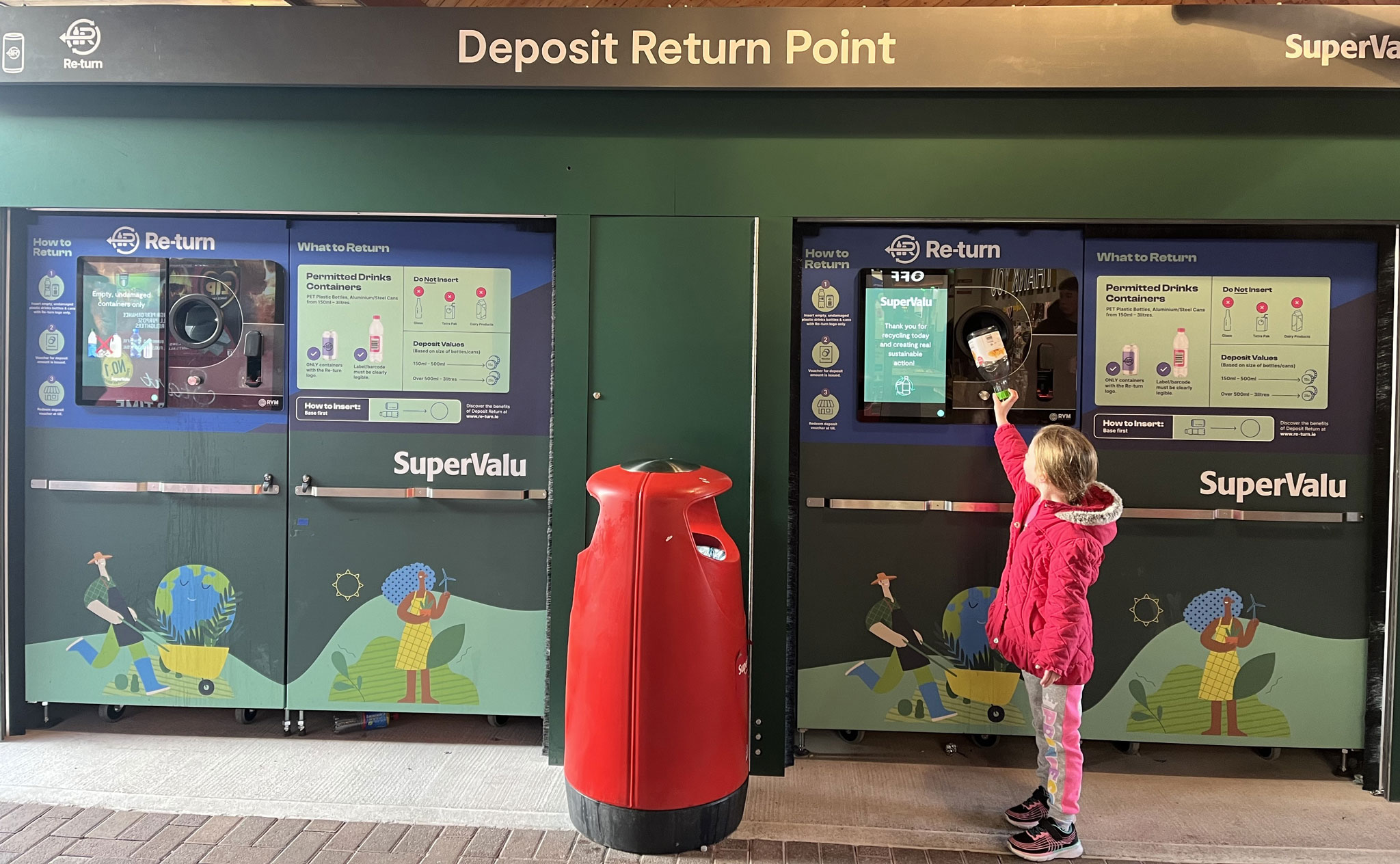Dr Anne Marie Kavanagh, School of Human Development, Dublin City University
Photo: Olivia O’Connor, aged 6, Senior Infant pupil at KRC ETNS, at the Deposit Return Point, SuperValu Killester, Dublin.
The recently introduced Deposit Return Scheme is Ireland’s latest environmental behavioural change initiative. The scheme is simple. Return your undamaged plastic bottles and cans and receive your refundable deposit in cash or redeemable vouchers. Introduced to increase Ireland’s recycling rate in line with EU directive targets, it is part of a wider plan to arrest the climate and ecological breakdown which is threatening our planet’s survival.
Our seas and water systems have become poisoned by toxin-saturated plastics and microplastics. Their production alone (from fossil fuels), generates vast amounts of greenhouse gases, meaning that even if successfully recycled, they remain a significant source of pollution and driver of climate change.
According to researchers, over 1 million water bottles are sold every minute worldwide, making plastic disposal an enormous global problem. Around 22 million plastic bottles are purchased in Ireland alone each week. The Deposit Return Scheme, introduced to deal with this problem, has been celebrated by Irish Government ministers as an initiative that will “boost recycling rates…improve the environment…[and] contribute to the circular economy by turning waste drinks containers into new bottles and cans”. While the scheme may reduce litter pollution – what percentage of the plastic bottles will be successfully recycled?
Research tells us that as little as 28% of plastics in Ireland are successfully recycled. The vast majority head either to landfills or incinerators. Greenpeace USA report that no plastic, not even water and soft drink bottles, meet the threshold to be called “recyclable” under the Ellen MacArthur Foundation’s New Plastic Economy Initiative standards. This points to the importance of probing beneath the surface of greenwashing initiatives, like The Deposit Return Scheme.
Given how ineffective recycling can be, is the solution as simple as buying less stuff, plastic in particular? Will consuming less in terms of products and services restore planetary wellbeing and save us money to boot?
Not quite.
In the first instance, to locate the problem with individual people’s personal choices is to misunderstand the root causes of our climate crisis – unbridled Capitalism. Sure, we should certainly eat less meat, buy local products, get solar panels, fly less often, and walk, cycle, or use public transport as much as possible. These are essential actions from responsible citizens who can afford financially to do so. But research tells us that it is large corporations that are doing the lion’s share of environmental damage. Since 1988, 100 corporations have been responsible for 71% of greenhouse gas emissions. It is these emissions, largely from the burning of fossil fuels, that are turbocharging climate and ecological breakdown, not the behavioural habits of individual consumers.
It is convenient for large corporations for us to focus on the individual causes of climate change. After all, British Petroleum (BP) invented the idea of the carbon footprint calculator – which encourages individuals to measure how their daily actions impact climate change. Why might large corporations want us to focus on ourselves as individual polluters? Could it be that linking climate change to personal choices shifts the burden of responsibility away from corporations and towards individual consumers? In the Irish context, we could ask why the Irish beverage industry was so willing to buy into The Deposit Return Scheme. Their buy-in within a “relatively short timeframe” was lauded by a Government minister in a press release to accompany the launch of the initiative.
What is Capitalism and how has it led us to the brink of planetary and ecosystem catastrophe?
Many people understand Capitalism to be an economic system, where workers work and are paid wages and privately owned businesses operate to pay their workers while making as much profit as possible.
But it is much more than this.
It is a system of power which shapes our understandings of reality, our identities, behaviour and interactions, and experiences of the world more broadly. It normalises an understanding of the natural world as a system of resources to be exploited, extracted, and commodified by humans in the interests of the market economy and corporate profit. It pushes a spend, spend, spend mentality bombarding us with messages that our worth, happiness and status are determined by the accumulation of material possessions and social media post-worthy experiences. Capitalism as noted by Senator Bernie Sanders in his newest book, It’s okay to be angry about Capitalism “destroys anything that gets in its way in the pursuit of profits. It destroys the environment”.
So, if the problem is corporate Capitalism, are we as individuals off the hook?
Not quite.
Environmental behavioural initiatives like the Deposit Return Scheme can mitigate the environmental damage caused by single-use plastics to a small degree. We can and should do better by consuming less goods and experiential purchases, particularly single-use plastics. However, the larger burden of responsibility lies with governments and large corporations. Governments can hold large corporations and their lobbyists accountable for the devastating impact they are having on our climate and ecological systems. They have the capacity to bring about meaningful change through regulation and climate litigation. Time is fast running out. Acting is not just a moral and ethical choice; it is a matter of survival.



